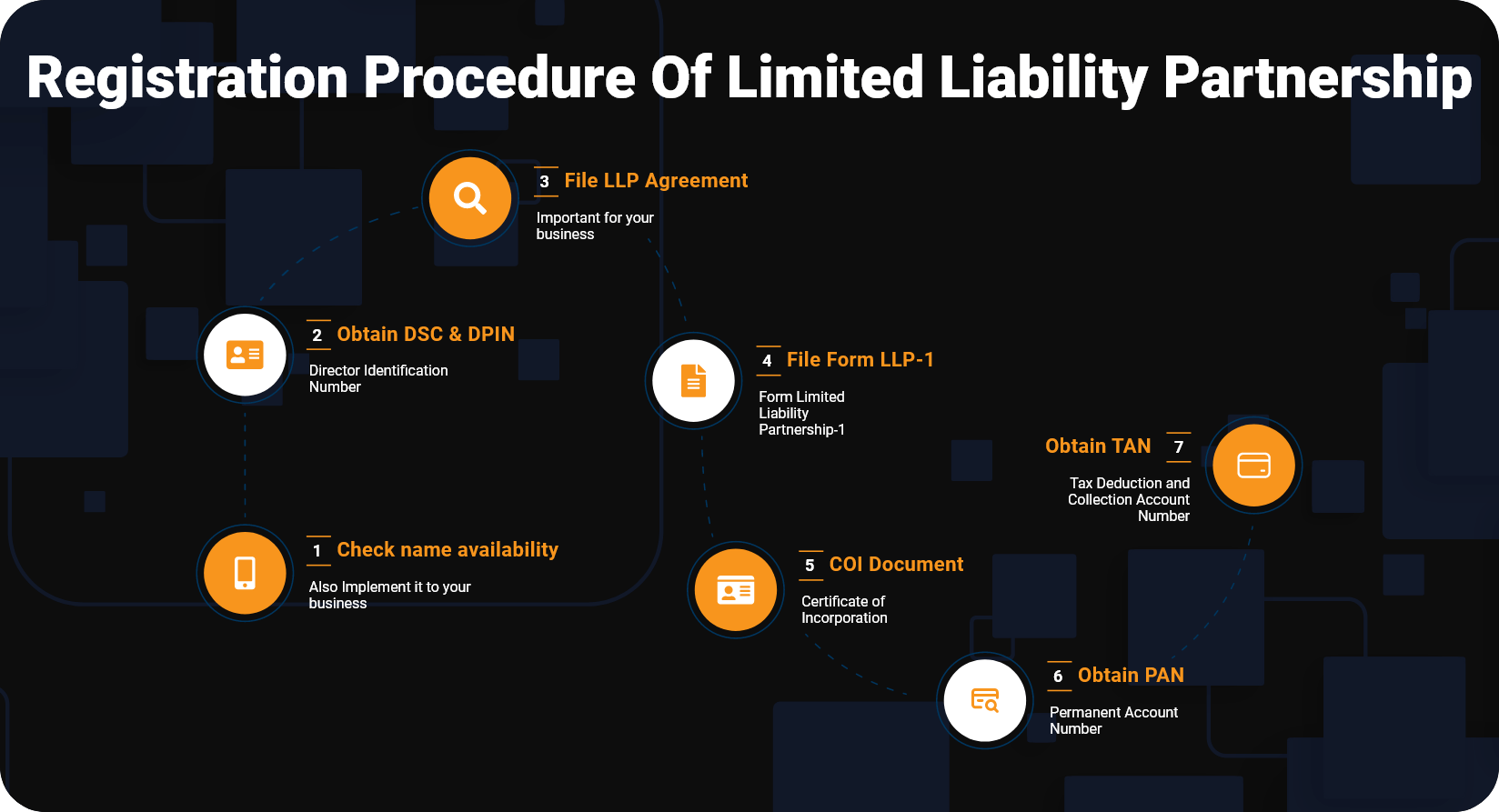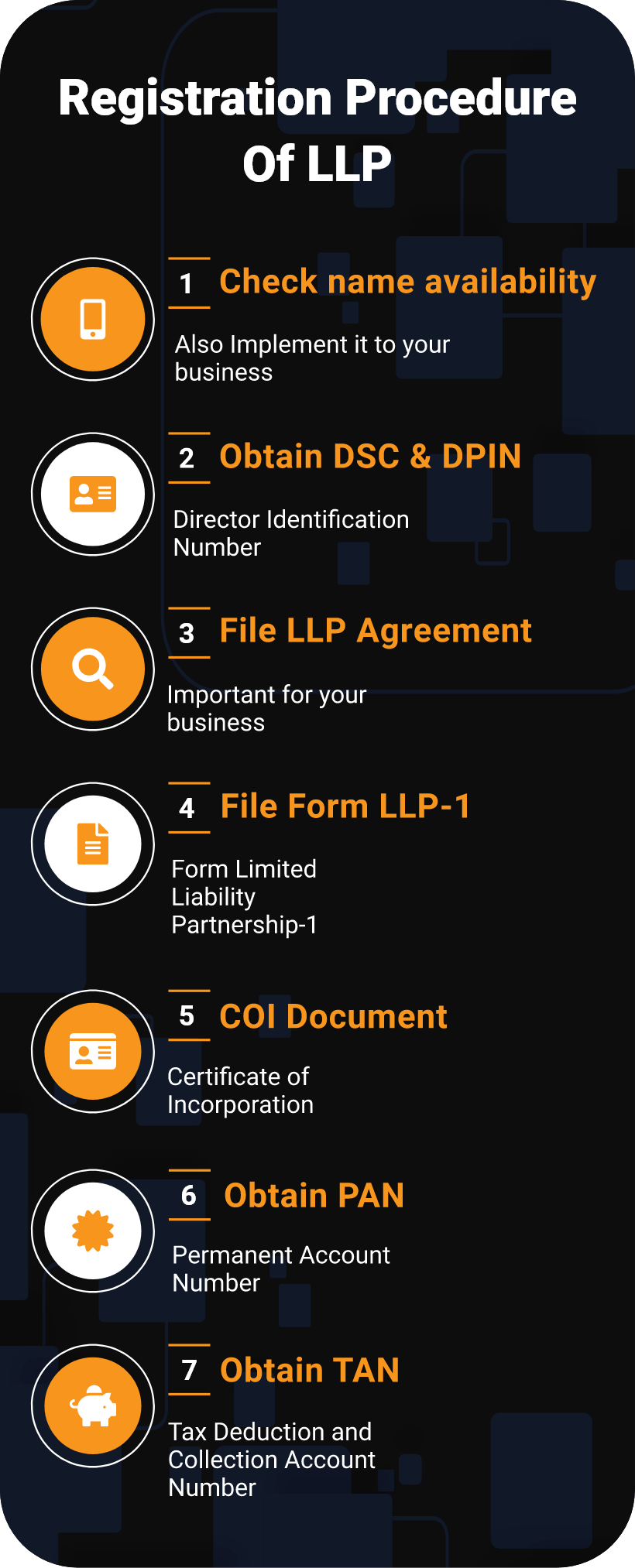 200k+ people
trust
us
200k+ people
trust
us

Limited Liability Partnership (LLP) Registration
Get
LLP Registration
@
Rs.8251 only /- (
Including GST)Terms & Condition

Government fees & stamp duties extra. Please fill form to get detailed quote in seconds.
In 2 Weeks . Transparent Pricing . No Hidden Cost
Get Absolutely Free In Package

PAN & TAN Registration

DIN and DSC for Partner

Complete Documentation

Personal Assistance

PF and ESIC Registration
Get Quote Instantly
Name *
Contact Number *
Email *
City/district *

0 Years
Of Experience

0 +
Cases Solved

0 +
Awards Gained

0 k +
Trusted Clients

0 k+
Queries Solved
One of India's preferred forms of business among entrepreneurs is Limited Liability
Partnership (LLP). LLP is an alternative corporate business form that gives the benefits
of both a Company and a Partnership Firm.
The LLP is a separate legal entity and
is liable to the full extent of its assets. Still, the liability of the partners is
limited to their agreed contribution to the LLP, and only a minimum of two partners are
required to incorporate an LLP. For Limited Liability Partnership to be a legally valid
entity, it must be registered under the Limited Liability Partnership Act, 2008.
So, are you ready to take your business to the next level? Legal251's Limited Liability
Partnership (LLP) Registration is the perfect way to do it! With our hassle-free
process, get all the legal assistance you need to register your LLP in no time, enjoy
the peace of mind that comes with Legal251's professional service, and get ready for
success!

All Service Comparison
Proprietorship vs Limited Liability Partnership (LLP) vs Company
Features
Proprietorship
Partnership
LLP
Company
Definition
A sole proprietorship is a business owned and operated by a single individual.
A partnership is a legal arrangement where two or more individuals or entities agree to share ownership, responsibilities, profits, and liabilities of a business.
An LLP is a hybrid business structure that combines elements of partnerships and company. It offers limited liability to its partners, protecting their personal assets from the liabilities of the business.
A company is a legal entity that exists separately from its owners (shareholders). It can be a private limited company or a public limited company. Shareholders' are the owners of the company and their liability is limited to their investment, and the company's operations and management are governed by the board of directors.
Ownership
In a proprietorship, a single individual owns and manages the business.
A partnership involves two or more individuals (partners) who share ownership and management responsibilities.
Partners have limited liability, meaning their personal assets are generally protected from business debts or liabilities.
A company is a legal entity separate from its owners (shareholders). Shareholders have limited liability, and their personal assets are not typically at risk for company debts.
Registration Time
7-15 working days
Promoter Liability
Unlimited Liability
Limited Liability
Governance
Governed by Local Laws
Under Partnership Act, 1932
LLP Act, 2008
Under Companies Act,2013
Compliance Requirements
Compliance in accordance with- Income Tax Laws and other Local Laws
Compliance in accordance with- Income Tax Laws and other Local Laws
Compliance in accordance with-Income Tax Laws, Local Laws, Companies Act and other as applicable
Compliance in accordance with-Income Tax Laws, Local Laws, Companies Act and other as applicable
Taxation
Income is taxed at the individual's income tax rates.
Income is generally taxed at the individual partners' income tax rates.
Taxed as a partnership, where partners are individually taxed on their share of profits.
Subject to corporate tax rates. Shareholders are taxed on dividends received.

-Registration@2x.png)

Limited Liability
The partners of an LLP have limited liability, which means their personal assets are protected in case of business debts or legal liabilities. The personal assets of partners are not at risk, and their liability is limited to their agreed-upon contribution to the LLP.

Separate Legal Entity
An LLP is a separate legal entity distinct from its partners. It can own assets, enter into contracts, and sue or be sued in its own name. This separation provides a clear distinction between personal and business matters.

Easy Formation and Maintenance
LLP registration involves a simple and straightforward process compared to other business structures like companies. It has fewer compliance requirements and ongoing obligations, reducing the administrative burden and costs of compliance.

Flexibility in Ownership and Management
LLPs provide flexibility in terms of ownership and management. Partners have the freedom to determine the profit-sharing ratio and the decision-making process within the LLP. They can also admit new partners or remove existing partners based on the LLP agreement.

No Minimum Capital Requirement
LLPs do not have any prescribed minimum capital requirement. Partners can contribute capital as per their agreement, making it easier to start and operate the business with lower financial obligations.

Taxation Benefits
LLPs enjoy the benefits of pass-through taxation. The LLP itself is not taxed at the entity level. Instead, the partners are taxed individually on their share of profits or income. This eliminates the issue of double taxation that companies may face.

Partner Liability Protection
LLP registration protects partners from being held personally liable for the wrongful acts or misconduct of other partners. Each partner is responsible for their own actions and is not automatically liable for the actions of other partners.

Increased Credibility
Registering as an LLP enhances the credibility and trustworthiness of the business. It provides a formal legal structure, which can be beneficial while dealing with clients, suppliers, lenders, and other stakeholders.

L ve From
ve From
Our Clients
Our customers love the convenience of filing with us and appreciate our expertise in getting their Legal work done on time. We value the trust our clients place in us, and we strive to provide them with the best service possible.

Kailash Chandra Verma
Proprietor , Balaji Apparels


"Amazing Platform"
Filing my GST returns had been an absolute nightmare until I found Legal251. The interface is so easy to use, it makes filing my returns on time a breeze. I can easily keep track of all my invoices and payments and Legal251 experts even provides helpful tips for me to make sure that everything is done correctly. Thanks to Legal251 team, filing GST returns has become stress-free!

Virendra Vishwkarma
Founder, Tirth Enterprises


"Highly recommended!"
I was having a hard time filing my GST returns and was really confused as to how to go about it. That's when I came across Legal251. They were thorough professionals who made sure that my documents were filed perfectly without any errors. Their customer service was also top-notch and they guided me through the entire process with ease. I'm glad that I chose Legal251 for filing my GST returns. Highly recommended!

Priyanka Agnihotri
CEO, 9 Telecom and Security


"Extremely Impressed"
I've been using Legal251 for filing my GST returns for the past few months and I'm extremely impressed with their service and platform. It's so easy to use, and all the necessary information is provided in a very organized way. Plus, filing my returns on time has become so much easier with this platform. Highly recommend Legal251 for anyone looking for an efficient way to file their GST returns.

Monu Panchal
Founder , Mishi Industries


"Excellent Knowledge "
I was a bit worried when filing my GST return for the first time, but Legal251 made it a breeze. Their team of experts guided me through every step and filed my return perfectly. I'm really glad I chose Legal251 to help me with this task as they have an excellent knowledge of the regulations and ensured that everything was done correctly. Thank you!




FREQUENTLY ASKED QUESTIONS
- A minimum of two partners (individuals or corporate entities).
- At least two designated partners (individuals) who will be responsible for compliance and management.
- A registered office address in India.
- LLP offers limited liability protection to partners, while a private limited company offers limited liability to its shareholders.
- An LLP has fewer compliance requirements and lower ongoing costs compared to a private limited company.
- An LLP is taxed as a partnership, with partners being individually taxed, while a private limited company is taxed separately at the entity level.


Growth & Improvement
We believe in growth and improvement at all costs. For us, growth is the law of life and it shall be fulfilled. We know the importance of business and its growth for you.

Support & Availability
We feel how much pain even a small problem or query can cause, that is the reason we are available to support you and solve any of such problems at every particular instance in time.

Experienced Team
All the members of our team are experienced individuals who believe in professionalism and customer satisfaction above all. Each one of them is passionate in their respective fields.

Focus
Any assigned task is of utmost importance to us, that's why our team members are always focused on taking care of even the smallest of our clients' needs and requirements.

Value for Money
We understand that the money being spent is hard-earned, therefore we utilize every single penny that you pay us in the most effective way possible hence providing the best value for money.

Care & Regards
We believe you to be a part of this family and that all your problems, as well as achievements, are our very own. Your interests are ours and their fulfillment is at the top in our regards.

Hi we are Online!
We are here to help you! Chat with us on WhatsApp for any discount queries or more.
















